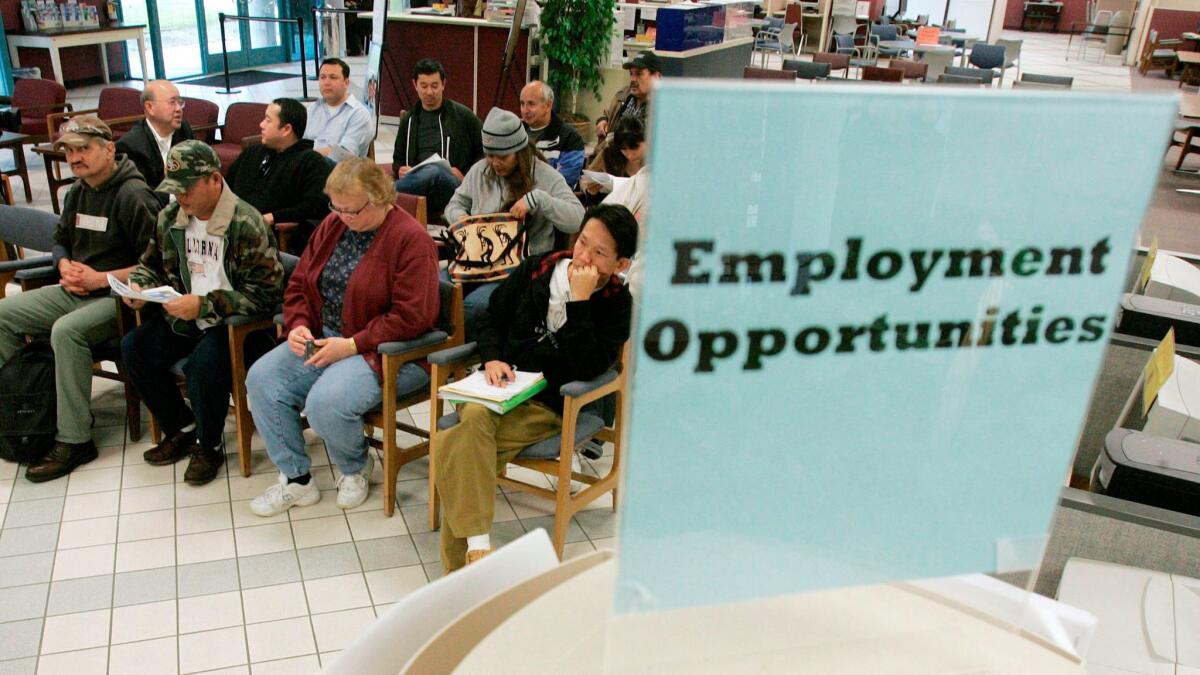Political Road Map: Trump’s budget presents new challenge to California’s long suffering unemployment fund

- Share via
After years of the state being deep in debt to the federal government for a loan covering the unemployment benefits of millions of Californians, state government officials have been promising the system was well on its way to stability.
And then came President Trump’s federal budget plan, with new rules and penalties for states whose jobless benefits outpace available dollars.
To understand what might be coming, it’s important to see where we’ve been. Unemployment insurance (UI) offers a weekly stipend of up to $450 for most workers who lose their job. The payments, for a maximum of 26 weeks, are paid from a payroll tax charged to employers.
Not surprisingly, unemployment payments rise and fall with the economy. In 2009, during the worst part of a recession when the unemployment rate hit 12.5% that October, state and federal government money was needed to keep California’s UI fund solvent. Payroll taxes simply couldn’t keep up with demand.
It’s worth noting that analysts saw this problem coming. State lawmakers made unemployment checks larger and raised the minimum wage in recent years, but the state portion of employer contribution rates hasn’t changed since 1984. The recession turned the problem into a crisis.
By the end of 2012, California owed $10.2 billion to the federal government for loans to the state’s UI trust fund. The debt has slowly been paid off, thanks to economic improvement that’s cut unemployment to 4.8% as of April. There’s also been a temporary surcharge on the federal government’s portion of the employer payroll tax. Current estimates are that the state’s UI fund will again be solvent in 2018.
Political Road Map: California hopes to make a $12 billion pension payment next year »
But the president’s budget may present a new wrinkle. The Trump proposal specifically calls for a new “solvency standard” for unemployment funds, a requirement that states keep enough cash in their UI funds to avoid going into the red.
Here’s where things could get dicey. Because California’s UI fund remains in the red, any new federal mandates would almost certainly mean a new short-term cost to employers. The president’s budget suggests states should have enough money to pay unemployment benefits for six months of an “average recession,” though it doesn’t define what that means. States failing to meet the standard would have new limits on loans— the same kind of loans that kept jobless Californians with money in their pockets during the last recession.
Then there’s the reality that the only real solutions for California’s unemployment fund are to permanently raise the employer payroll tax, shrink the benefits or eligibility rules for workers or some combination of the two. An overhaul suggested by the state’s independent Legislative Analyst’s Office last fall included possibly cutting maximum jobless benefits by $75 a week and denying eligibility to some of the state’s lowest income workers.
So what’s driving the effort in Washington? It doesn’t look as ifit’s about being fiscally conservative. The Trump administration budget suggests new rules on state unemployment funds are in preparation for a proposal to create a federal mandatory paid leave of at least six weeks for workers — similar to California’s existing program, and a new mandate to likely be paid out of state UI funds.
Few state officials would disagree that California’s system for helping millions of unemployed workers was unprepared for the last economic downturn and that big changes to its financing system are long overdue. And so maybe the president’s budget plan — even if it fails to fully take effect — could be the needed spark for Sacramento lawmakers to roll up their sleeves on a long-term fix.
Follow @johnmyers on Twitter, sign up for our daily Essential Politics newsletter and listen to the weekly California Politics Podcast
ALSO:
Gov. Jerry Brown’s revised budget shrinks the state’s deficit, warns of federal changes
Political Road Map: There’s little lawmakers can do to exert control on the University of California
Updates on California politics
More to Read
Get the L.A. Times Politics newsletter
Deeply reported insights into legislation, politics and policy from Sacramento, Washington and beyond. In your inbox twice per week.
You may occasionally receive promotional content from the Los Angeles Times.











